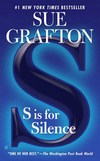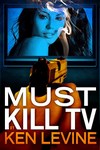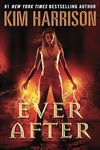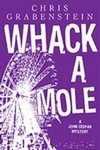by Kim Harrison
Series: The Hollows, #11Mass Market Paperback, 528 pg.
Harper Voyager, 2013
So here we are at Hollows #11 — or as I prefer to think of them, The Adventures of Jenks and his Tenants. It’s the best in quite a while, if you ask me.* I’ve had a hard time maintaining a real interest in these lately, and have only persisted because I’ve read so many of them and I’m curious about how Harrison brings the series to a close. The nominal main character, Rachel, did make a radical developmental leap two books back — and while that served as the core of #10, I think it paid off here.
Thankfully.
Since the events at the end of #9, Rachel’s been more proactive, less wishy-washy about her personal life, and generally more interesting than she’d been. This is definitely the best use of her I can remember.
Ivy is still criminally misused and underused. I can’t believe that Harrison still cares about her at all — keeping her “off screen” so much, and then having her do practically nothing meaningful once she shows. Yes, I can see where the groundwork is being laid for a major Ivy storyline, but at this point, I have no confidence that we’ll see it — and if we do? I can’t see it working too well.
Jenks, on the other hand, played an important role throughout — his presence effected the story, he mattered. Not just because I like him better than anyone else in this universe, but the way Harrison uses him is so far superior to any other character, I like him more and more each passing novel. The stuff with his kids, and Belle, while not that important, in the grand scheme of things, grounds the novel and the characters.
Trent continues to grow on me — I was ready for the series to dump him ages ago, but now I really enjoy him. I still think that it’d have made sense, and been a healthier/wiser choice for Ivy and Rachel to have nothing more to do with him after maybe the third book, but that’s clearly not what Harrison wanted, and it’s paying off. Best use of him yet — the way he treats, and wanted to treat Rachel throughout this is so much better than he’s done before — character growth is always good. I wish Rachel got a bit more of it to match him.
Couple of quick character moments before I move on — Bis is such a great addition to the series, and this time we get to meet more gargoyles. I wouldn’t mind a few short stories featuring them (nothing against Anton Strout’s gargoyle series, I should add). I even liked Newt and Al for maybe the first time ever — but I really can’t get into the details there.
The seeds for the plot were planted from the beginning of the series, and were watered consistently — so the payoff here was well-earned, and dealt with correctly. The choices that Quen, Trent and Rachel are forced to make, the actions they take aren’t easy and felt like things people would choose to do, not merely decisions made for the sake of moving the story along (something I don’t think Harrison has consistently done). It’s really the best since, maybe book #4 in that regard.
The last chapter served as a really good epilogue, as well as setting the stage for the future — along with providing a lot of fodder for the various ‘shippers out there (most of this book does that, really). If Harrison’s doing what I think she’s doing here, I will be pleased.
In the end, a pleasant addition to this series, one that exceeded my expectations — can’t ask for much more than that.
* Apparently, I said the same thing after #10, but I don’t remember thinking that.
—–

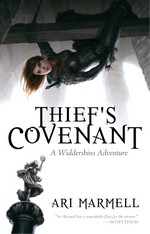 Thief’s Covenant
Thief’s Covenant


